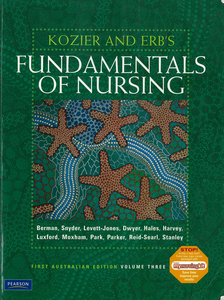Stress and coping
Fillingham, Amanda (2010) Stress and coping. In: Berman, Audrey, Snyder, Shirlee J., Kozier, Barbara, Erb, Glenora, Levett-Jones, Tracy, Dwyer, Trudy, Hales, Majella, Harvey, Nichole, Luxford, Yoni, Moxham, Lorna, Park, Tanya, Parker, Barbara, Reid-Searl, Kerry, and Stanley, David, (eds.) Kozier and Erb's Fundamentals of Nursing. Pearson Australia, Frenchs Forest, NSW, Australia, pp. 1118-1138.
![[img]](https://researchonline.jcu.edu.au/17144/1.hassmallThumbnailVersion/17144_Fillingham_2010_Book_Cover.jpg)
|
Image (JPEG) (Book Cover)
- Cover Image
Download (2MB) |
|
|
PDF (Published Version)
- Published Version
Restricted to Repository staff only |
Abstract
For years Kozier & Erb’s Fundamentals of Nursing has been the gold standard in helping students embarking on their nursing careers. This first Australian edition retains many of the features that have made this textbook the number-one choice of nursing students and lecturers.
To further enhance this popular fundamentals textbook and ensure its appropriate application for Australian students, nursing academics from across Australia were invited to review and comment on each of the 52 chapters. Their detailed feedback has ensured that Kozier & Erb’s Fundamentals of Nursing: First Australian Edition is a current, engaging and uniquely Australian textbook that will help students succeed in their nursing studies.
Kozier and Erb’s Fundamentals of Nursing, First Australian Edition presents the fundamentals of nursing care within the framework of the nursing process. This text offers an accessible writing style; a focus on practical application with real-world Australian examples and case studies; appropriate Australian terminology, policies and procedures, Australian visuals; an integrated approach to Australian Indigenous health issues; and up-to-date references, research and codes of practice, with reference to ANMC guidelines. The text is supported by a state-of-the art technology package to enhance the learning process.
Chapter 42: Stress is a universal phenomenon. All people experience it. Parents refer to the stress of raising children, working people talk of the stress of their jobs and students at all levels talk of the stress of school. Stress can result from both positive and negative experiences. For example, a bride preparing for her wedding, a graduate preparing to start a new job and a husband concerned about caring for his wife and family following a diagnosis of cancer all experience stress reactions. Within Australia 1 in 5 people now suffer from stress, and suggested reasons for this high incidence include socioeconomic status and social disorganisation within neighbourhoods (McMurray 2007). Stress affects all adults all over the world and is not restricted to one particular culture; however, in areas where social capital is greater there is less stress and depression. Australia is a very diverse and multicultural country. The word health has different meanings for different people; even within the same culture people's understanding of health can differ. 'Health to Aboriginal people embraces all aspects of living and stresses the importance of living in harmony with the environment' (Eckerman et al. 2004). The concept of stress is important because it provides a way of understanding the person as a being who responds in totality (mind, body and spirit) to a variety of changes that take place in daily life.
LEARNING OUTCOMES: - Differentiate the concepts of stress as a stimulus, as a response and as a transaction. - Describe the three stages of Selye's general adaptation syndrome. - Identify physiologic, psychologic and cognitive indicators of stress. - Differentiate four levels of anxiety. - Identify behaviours related to specific ego defence mechanisms. - Discuss types of coping and coping strategies. - Identify essential aspects of assessing a client's stress and coping patterns. - Identify nursing diagnoses related to stress. - Describe interventions to help clients minimise and manage stress.
| Item ID: | 17144 |
|---|---|
| Item Type: | Book Chapter (Teaching Material) |
| ISBN: | 978-1-4425-0471-4 |
| Keywords: | alarm reaction, anger, anxiety, burnout, caregiver burden, coping, coping mechanism, coping strategy, countershock phase, crisis counselling, crisis intervention, depression, ego defence mechanisms, fear, general adaptation syndrome (GAS), local adaptation syndrome (LAS), shock phase, stage of exhaustion, stage of resistance, stimulus-based stress model, stress, stressor, transactional stress theory |
| Related URLs: | |
| Additional Information: | An updated version of this chapter is available at the related URL. |
| Date Deposited: | 27 Apr 2011 01:41 |
| FoR Codes: | 11 MEDICAL AND HEALTH SCIENCES > 1110 Nursing > 111099 Nursing not elsewhere classified @ 100% |
| SEO Codes: | 92 HEALTH > 9202 Health and Support Services > 920210 Nursing @ 100% |
| Downloads: |
Total: 364 Last 12 Months: 5 |
| More Statistics |



